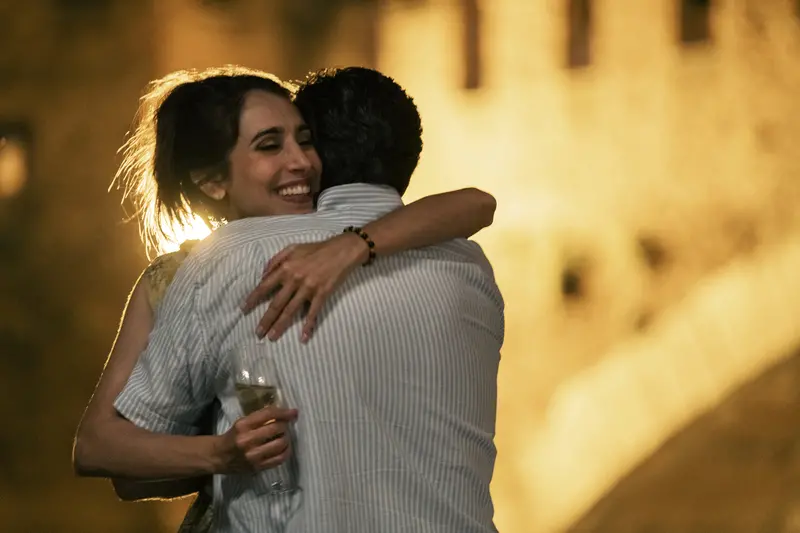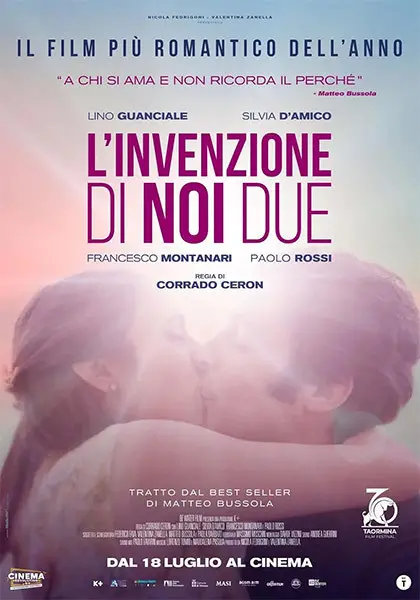

L'invenzione di noi due, second work by Corrado Ceron, stars Lino Guanciale, Silvia D'Amico, Francesco Montanari and Paolo Rossi. The film is based on the novel of the same name by Matteo Bussola with story and screenplay by Valentina Zanella, Matteo Bussola, Paola Barbato.
It tells the story of Milo and Nadia whose marriage of 15 years is in crisis. When Milo realizes that his wife no longer desires him, he starts writing her emails under a false name, something they did at school when they would leave messages on their desks before they knew each other. This increasingly dense and intense correspondence reveal themselves as never before.
The most iconic corners of Verona, where the film was shot, plus some of its hidden secrets, are revealed, in scenes of the present and happy past.
The first scene features Parco Giardino Sigurtà, a 60-hectare nature park in Valeggio sul Mincio. Images from above reveal its fascinating labyrinth with central tower, where a man and a woman are chasing each other inside unable to meet.
We learn that Milo and Nadia met at a party near ponte Scaligero, part of the Castelvecchio fortress, built in medieval times on the Adige for military purposes. Neither knew they were meeting the companion of many conversations written on a school desk. Thus began a period of absolute happiness. The park, giardini Sandro Pertini provides the backdrop for many carefree moments, and also profound reflections.
The places where Milo and Nadia’s present and past unfold include: Santa Marta library; piazza Erbe with the Gardello tower; piazza dei Signori; the facade of the Basilica of San Zeno Maggiore, a masterpiece of medieval architecture - a thoughtful Nadia is sitting at the entrance; the neoclassical facade of Palazzo Barbieri glimpsed behind Milo as he crosses piazza Bra on an old scooter; and, of course, the Arena, symbol of Verona.
L'invenzione di noi due, second work by Corrado Ceron, stars Lino Guanciale, Silvia D'Amico, Francesco Montanari and Paolo Rossi. The film is based on the novel of the same name by Matteo Bussola with story and screenplay by Valentina Zanella, Matteo Bussola, Paola Barbato.
It tells the story of Milo and Nadia whose marriage of 15 years is in crisis. When Milo realizes that his wife no longer desires him, he starts writing her emails under a false name, something they did at school when they would leave messages on their desks before they knew each other. This increasingly dense and intense correspondence reveal themselves as never before.
The most iconic corners of Verona, where the film was shot, plus some of its hidden secrets, are revealed, in scenes of the present and happy past.
The first scene features Parco Giardino Sigurtà, a 60-hectare nature park in Valeggio sul Mincio. Images from above reveal its fascinating labyrinth with central tower, where a man and a woman are chasing each other inside unable to meet.
We learn that Milo and Nadia met at a party near ponte Scaligero, part of the Castelvecchio fortress, built in medieval times on the Adige for military purposes. Neither knew they were meeting the companion of many conversations written on a school desk. Thus began a period of absolute happiness. The park, giardini Sandro Pertini provides the backdrop for many carefree moments, and also profound reflections.
The places where Milo and Nadia’s present and past unfold include: Santa Marta library; piazza Erbe with the Gardello tower; piazza dei Signori; the facade of the Basilica of San Zeno Maggiore, a masterpiece of medieval architecture - a thoughtful Nadia is sitting at the entrance; the neoclassical facade of Palazzo Barbieri glimpsed behind Milo as he crosses piazza Bra on an old scooter; and, of course, the Arena, symbol of Verona.

Milo, Nadia’s husband of fifteen years, realizes that she no longer desires him. She doesn't look at him, doesn't listen to him, shares almost nothing anymore. Milo isn’t prepared to give up so he writes to her pretending to be someone else, starting a secret correspondence. In those letters, increasingly dense and intense, both of them reveal themselves as never before.